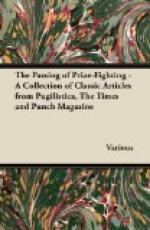And writers in the main eschewed
All topics tending to disquiet,
All efforts to reorganize
Our dogmas or our diet;
You could not carp at MENDELSSOHN
Without creating quite a scandal,
And rag-time on the gramophone
Had not supplanted HANDEL.
Blameless and wholesome in their way,
At times agreeably subacid,
I love these records of a day
Long dead, but calm and placid;
And with a sigh I now replace
This ancient volume of Belgravia
And turn the “latest news”
to face
Mutans amaris suavia.
* * * * *
[Illustration: Rector’s Daughter. “HOW SPLENDID OF JOE JARVIS’S SON TO VOLUNTEER FOR THAT VERY DANGEROUS JOB! I’M SO GLAD HE GOT THE MILITARY MEDAL.”
Mrs. Mullins (not to be outdone). “YES, MISS. AND MY BOY COULD HAVE GOT IT TOO IF HE’D CARED TO HAVE TAKEN THE RISK.”]
* * * * *
A SLUMP IN MARIONETTES.
“For the first time
for centuries the Old Bailey Sessions were opened
on Tuesday without the customary
ceremonies connected with the
summoning of a Grand Judy.”—Lincolnshire
Echo.
* * * * *
“Too proud to fight” has now become “Proud to fight too.”
* * * * *
“‘It was between
half-past seven and eight,’ said a fireman, ’and
as I
was off duty I came out on
deck for a blow. The force of the explosion
threw me along the deck for
some yards.’”—Daily Paper.
“This is indeed a blow,” said the gallant stoker—we don’t think.
* * * * *
[Illustration: “HENRY, I WISH YOU WOULD WRITE TO THE URBAN COUNCIL AND TELL THEM TO SEND A DUSTMAN WHO TURNS HIS TOES IN. OUR ROCK BORDER’S BEING COMPLETELY RUINED!”]
* * * * *
OUR BOOKING-OFFICE.
(By Mr. Punch’s Staff of Learned Clerks.)
I have the feeling that when Mr. RUDYARD KIPLING called his new volume A Diversity of Creatures (MACMILLAN) he was rather taking the word out of my mouth, or the sword out of my hand, or whatever one does for the confusion and discomforting of critics. Because it is just the extreme diversity of the tales herein which, while providing (as they say) something for all tastes, makes it very hard to appraise the book as a whole. In form it follows the KIPLING convention, endeared to us by so much pleasure, of sandwiching prose and verse, the poems echoing the idea of the tale that has preceded them, and themselves likely to prove for many the most attractive pages of the book. As for the stories, here we get diversity indeed; and not of theme alone. It is, of course, almost impossible for anything signed by Mr. KIPLING




